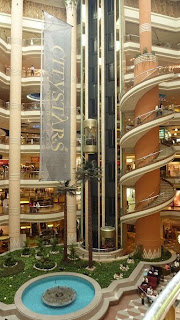 Perhaps the most frustrating thing about Cairo is the traffic. It's mayhem, as cars obey no rules, police enforce no laws, and donkey-driven carriages attempt to share the road with the cities 17 million inhabitants. Car horns continuously ring the Cairo streets at all hours and every once in a while, a trendy Egyptian's customized musical horn can be heard over the sea of monotonous beeping. Those of you living in LA or New York who think you can relate, you can't. Having experienced rush hour traffic in both these cities, I can state confidently that the clusterf*ck that is Cairo is far worse on a daily basis than any of these cities on their worst day. Cairo makes LA look sane.
Perhaps the most frustrating thing about Cairo is the traffic. It's mayhem, as cars obey no rules, police enforce no laws, and donkey-driven carriages attempt to share the road with the cities 17 million inhabitants. Car horns continuously ring the Cairo streets at all hours and every once in a while, a trendy Egyptian's customized musical horn can be heard over the sea of monotonous beeping. Those of you living in LA or New York who think you can relate, you can't. Having experienced rush hour traffic in both these cities, I can state confidently that the clusterf*ck that is Cairo is far worse on a daily basis than any of these cities on their worst day. Cairo makes LA look sane.To Hosni Mubarak and his close aides, Egypt is calm, quiet, and peaceful. Curfews are imposed and enforced when the Egyptian leader decides to travel, and so Mubarak never experiences Egypt's Achilles Heel. This of course, has the adverse effect of delaying millions of Cairenes from their daily lives, forcing them to sit even longer hours in traffic.
 The issue here is not simply about congested streets, or curfews. It is part of a much broader issue that seems to be on everyone's tongue in this country: the disconnect between the ruling regime and the reality on the ground. If all Hosni Mubarak sees in Egypt are empty streets, free of not only cars but beggars, street vendors, uncollected garbage, and donkey carts; how can he be expected to address these issues? Yet out of fear and selfishness, the authoritarian leader has placed himself in a bubble that he refuses to leave. Even his son Gamal, when he most likely ascends to the Egyptian throne, should not be expected to acknowledge these problems. The young politician, as we all know, was born with a silver spoon in his mouth, and comes from the most privileged family in Egypt. He too, has no idea of the daily grievances of the average Egyptian.
The issue here is not simply about congested streets, or curfews. It is part of a much broader issue that seems to be on everyone's tongue in this country: the disconnect between the ruling regime and the reality on the ground. If all Hosni Mubarak sees in Egypt are empty streets, free of not only cars but beggars, street vendors, uncollected garbage, and donkey carts; how can he be expected to address these issues? Yet out of fear and selfishness, the authoritarian leader has placed himself in a bubble that he refuses to leave. Even his son Gamal, when he most likely ascends to the Egyptian throne, should not be expected to acknowledge these problems. The young politician, as we all know, was born with a silver spoon in his mouth, and comes from the most privileged family in Egypt. He too, has no idea of the daily grievances of the average Egyptian.Of course some may argue that sheltering the ruling regime is necessary for their safety, this begs the question: just how safe are these draconian policies making Hosni Mubarak? Certainly, isolating Egypt's ruler from the Egyptian public may lower the chances of a disgruntled Egyptian attacking the president, but doesn't it also increase the chance of further radicalizing young Egyptians? Feeling more and more ignored by their rulers, young Egyptians are forced to sit back and wait, having only known life under Hosni Mubarak's thirty year iron-fist rule. Stuck in traffic, growing more frustrated by the day, as the desert sun further beats them down.
